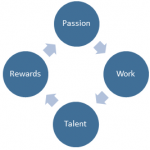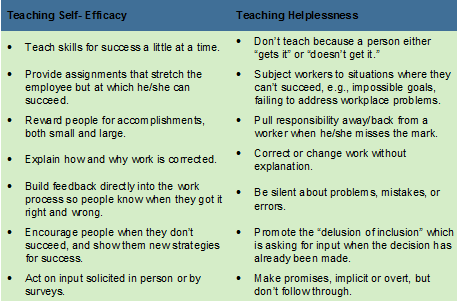It’s good to know that everyone is different. But it is much more important and useful for managers to master the motivational principles that apply to 9.53 in 10 people (at my last count). Here we will discuss just one of those principles – Control.
Control
The party was billed as a “Creativity Soiree” and the invitation said bring something “made or found to share” – that’s it. Ken didn’t register at the Apple Store, neither did he make a gift list, nor place any other parameters around what we should bring to the party. Just bring something that you made or found to share; that is all he asked. If that sounds like an offer pregnant with possibilities, it might just be because it was! Bring what you want; do what you do; show me what you like, demonstrate your talent; take a risk, be safe; reveal yourself or don’t.
Ken’s offer gave limitless control to his guests, saying to choose something “from the entire world.” And what did we choose? First we chose to work! Benjamin, his 8-year-old son, chose to spend 16 hours using CAD software to create a 3D model of a house for Ken.  Jeff chose to use watercolors; his wife chose to use pencil; Lisa made a gorgeous edible arrangement. I don’t know how long they labored, but they surely did. Second, they chose to engage their passion, and where there is passion there is usually talent. And where talent and work combine, rewards show-up. It is a self-reinforcing cycle. Jeff confessed to being impressed with his watercolor bunny, and so did everyone else. Do you think he will go on painting? I do.
Jeff chose to use watercolors; his wife chose to use pencil; Lisa made a gorgeous edible arrangement. I don’t know how long they labored, but they surely did. Second, they chose to engage their passion, and where there is passion there is usually talent. And where talent and work combine, rewards show-up. It is a self-reinforcing cycle. Jeff confessed to being impressed with his watercolor bunny, and so did everyone else. Do you think he will go on painting? I do.
You may suspect that control provides motivational power because it gives people the chance to do what they like and are good at. That is true, but it is only part of the picture. Control also satisfies the inborn desires for self-direction, significance, and the power over one’s environment. People who do not experience the power to control their world, stop. They stop thinking and wait to be told what to do. They stop believing what they do matters, so they stop trying. They become pathetic, depressed zombies on the job. Psychologists have a name for it – it’s called learned helplessness. And whatever can be learned can be unlearned. Helplessness is learned through failure. When effort fails to yield success, when it fails to provide valued rewards, the lesson is “it is no use.” The opposite of helplessness is “self-efficacy,” which is the belief that “I” can make things happen, and it leads to high levels of effort, persistence, strategizing, and performance.
I have seen managers teach both helplessness and self-efficacy on the job. Here are some of the ways I have seen it done.
So we see can that choice (or control) directly influences motivation by giving a person the opportunity to engage their passions and talents. Choice also synchronizes with a person’s natural desire to direct their own lives and “prove” their significance. Finally, it teaches us that we are “powerful” – that we can. And that is a powerful idea, so powerful in fact that it swept Barak Obama into the Presidency of the United States of America.
The paradox of control and choice for leaders is that it must be given away to have any power, and that is why managers often struggle with it. While managers have more discretionary power and are counted on for their good judgment, they must employ it prudently and infrequently to allow others the room for significance.

